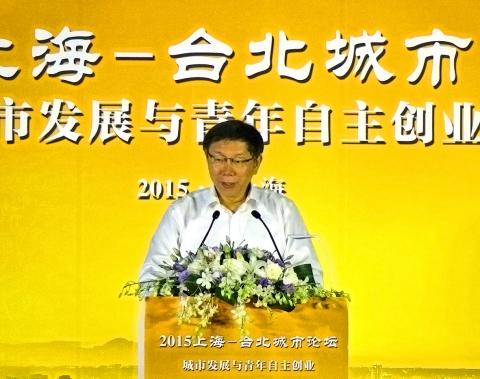Taipei Mayor Ko Wen-je (柯文哲) yesterday expounded on his views on cross-strait relations at the Taipei-Shanghai forum, touting what he called the “2015 new standpoint,” which he said is built on “four reciprocal processes” and a motif that both sides of the Taiwan Strait are “one family.”
Ko made the remarks during his speech at the opening ceremony for the forum.
Ko started his speech by talking of the impermanence of the world today, before narrowing his subject down to what he described as the “long-lasting friendship” between Taipei and Shanghai.

Photo: CNA
“This is an ever-changing world. Seven years ago, who would have thought that the iPhone would change the world? A year ago, who would have thought that I would become the mayor of Taipei? Just a month ago, who would have thought that I would be standing here in front of you today?” he said. “However, one thing remains unchanged, and that is the long-lasting friendship that Taipei and Shanghai have established.”
Ko said that his stance on cross-strait relations and the forum can be summarized as “one family across the Strait” and four “reciprocal” actions: to know each other, to understand each other, to respect each other and to work with each other.
He said that he has always abided by these principles to promote exchanges and increase goodwill across the Taiwan Strait, and that he hoped that Taipei and Shanghai would build on their “political common ground” and work together to boost cross-strait exchanges and push for peaceful development to serve the best interests of people on both sides of the Strait.
Responding to media queries after the speech, Ko said that he proposed the “2015 new standpoint” in March, and that he sees it as a new direction and starting point for cross-strait exchanges.
Asked whether he was concerned that his stance would spark controversy in Taiwan, he said: “I do not expect all political parties to accept it, but at least it would be tolerable. There has got to be something on the table so that everyone can engage in exchanges.”
He said that the greatest consensus formed between him and Shanghai Mayor Yang Xiong (楊雄) during the organization of the forum concerns the employment of a novel method in which “the public goes first; the government supports.”
“I believe that this method would also apply to future cross-strait exchanges. Through organizing forums, members of the public can discuss the issues among themselves. The government can then provide the necessary help according to the conclusions they reach,” he said, adding that the epiphany was his biggest reward during his visit to Shanghai.

‘TAIWAN-FRIENDLY’: The last time the Web site fact sheet removed the lines on the US not supporting Taiwanese independence was during the Biden administration in 2022 The US Department of State has removed a statement on its Web site that it does not support Taiwanese independence, among changes that the Taiwanese government praised yesterday as supporting Taiwan. The Taiwan-US relations fact sheet, produced by the department’s Bureau of East Asian and Pacific Affairs, previously stated that the US opposes “any unilateral changes to the status quo from either side; we do not support Taiwan independence; and we expect cross-strait differences to be resolved by peaceful means.” In the updated version published on Thursday, the line stating that the US does not support Taiwanese independence had been removed. The updated

‘CORRECT IDENTIFICATION’: Beginning in May, Taiwanese married to Japanese can register their home country as Taiwan in their spouse’s family record, ‘Nikkei Asia’ said The government yesterday thanked Japan for revising rules that would allow Taiwanese nationals married to Japanese citizens to list their home country as “Taiwan” in the official family record database. At present, Taiwanese have to select “China.” Minister of Foreign Affairs Lin Chia-lung (林佳龍) said the new rule, set to be implemented in May, would now “correctly” identify Taiwanese in Japan and help protect their rights, the Ministry of Foreign Affairs said in a statement. The statement was released after Nikkei Asia reported the new policy earlier yesterday. The name and nationality of a non-Japanese person marrying a Japanese national is added to the

AT RISK: The council reiterated that people should seriously consider the necessity of visiting China, after Beijing passed 22 guidelines to punish ‘die-hard’ separatists The Mainland Affairs Council (MAC) has since Jan. 1 last year received 65 petitions regarding Taiwanese who were interrogated or detained in China, MAC Minister Chiu Chui-cheng (邱垂正) said yesterday. Fifty-two either went missing or had their personal freedoms restricted, with some put in criminal detention, while 13 were interrogated and temporarily detained, he said in a radio interview. On June 21 last year, China announced 22 guidelines to punish “die-hard Taiwanese independence separatists,” allowing Chinese courts to try people in absentia. The guidelines are uncivilized and inhumane, allowing Beijing to seize assets and issue the death penalty, with no regard for potential

‘UNITED FRONT’ FRONTS: Barring contact with Huaqiao and Jinan universities is needed to stop China targeting Taiwanese students, the education minister said Taiwan has blacklisted two Chinese universities from conducting academic exchange programs in the nation after reports that the institutes are arms of Beijing’s United Front Work Department, Minister of Education Cheng Ying-yao (鄭英耀) said in an exclusive interview with the Chinese-language Liberty Times (the Taipei Times’ sister paper) published yesterday. China’s Huaqiao University in Xiamen and Quanzhou, as well as Jinan University in Guangzhou, which have 600 and 1,500 Taiwanese on their rolls respectively, are under direct control of the Chinese government’s political warfare branch, Cheng said, citing reports by national security officials. A comprehensive ban on Taiwanese institutions collaborating or